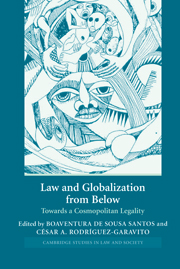Book contents
- Frontmatter
- Contents
- Notes on the contributors
- 1 Law, politics, and the subaltern in counter-hegemonic globalization
- PART ONE LAW AND THE CONSTRUCTION OF A GLOBAL ECONOMY OF SOLIDARITY
- PART TWO TRANSNATIONAL SOCIAL MOVEMENTS AND THE RECONSTRUCTION OF HUMAN RIGHTS
- PART THREE LAW AND PARTICIPATORY DEMOCRACY: BETWEEN THE LOCAL AND THE GLOBAL
- Index
- References
1 - Law, politics, and the subaltern in counter-hegemonic globalization
Published online by Cambridge University Press: 07 July 2009
- Frontmatter
- Contents
- Notes on the contributors
- 1 Law, politics, and the subaltern in counter-hegemonic globalization
- PART ONE LAW AND THE CONSTRUCTION OF A GLOBAL ECONOMY OF SOLIDARITY
- PART TWO TRANSNATIONAL SOCIAL MOVEMENTS AND THE RECONSTRUCTION OF HUMAN RIGHTS
- PART THREE LAW AND PARTICIPATORY DEMOCRACY: BETWEEN THE LOCAL AND THE GLOBAL
- Index
- References
Summary
INTRODUCTION
This book arose from our puzzlement at the paradoxical state of sociolegal knowledge on globalization. The beginning of the new millennium has witnessed a groundswell of proposals for the transformation or replacement of the national and international legal institutions underpinning hegemonic, neoliberal globalization. Put forth by variegated counter-hegemonic movements and organizations and articulated through transnational networks, these proposals challenge our sociological and legal imagination and belie the fatalistic ideology that “there is no alternative” to neoliberal institutions.
The initiatives are as diverse as the organizations and networks advocating them, as the case studies in this book lay bare. Impoverished women in Tanzania as well as marginalized communities and progressive parties in Brazil mobilize to change and democratize the national and international regulatory frameworks that effectively exclude them from key political arenas such as the process of allocating public budgets (see Rusimbi and Mbilinyi's and Santos' chapters on participatory budgeting). NGOs, unions, consumers, workers, and other actors in the global North and South organize to challenge the market-friendly regulation of labor conditions, corporate accountability, intellectual property rights, and the environment which fuels the spread of sweatshops in the Americas, the African AIDS pandemic, and environmental degradation in Europe (see Rodríguez-Garavito's, Shamir's, Klug's, and Arriscado, Matias, and Costa's chapters).
- Type
- Chapter
- Information
- Law and Globalization from BelowTowards a Cosmopolitan Legality, pp. 1 - 26Publisher: Cambridge University PressPrint publication year: 2005
References
- 70
- Cited by

